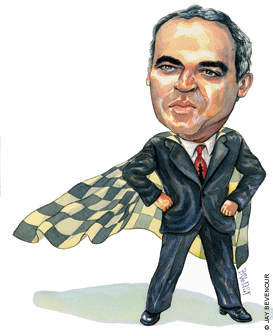
When Garry Kasparov became the World Chess Champion in 1985 at the tender age of 22, almost everybody was happy for him. Everyone, that is, except the wife of the former world champion. “She looked at me and said, ‘Young man, I’m sorry,’” Kasparov recalled during a recent visit to campus. “‘I’m sorry for you because the happiest moment of your life has passed.’”
“The good news,” the Russian grandmaster added, “is I have some things accomplished to prove her wrong.”
Kasparov, who spoke at the Philomathean Society’s Annual Oration in April, was happy to report that he’s more than a chess player; he’s also a writer and a philanthropist. And since retiring from chess in 2005, Kasparov has turned his attention to political activism, founding the United Civil Front, a social movement dedicated to restoring electoral democracy in Russia.
The event was part of a yearlong focus on games and game-play, sponsored by the Office of the Provost. Naturally, despite all that he’s done apart from chess, Kasparov began by discussing the game.
He reckons that chess and the decision-making skills he learned by playing the game are central to many of his life’s accomplishments. For him, the game of chess isn’t too different from the game of life: it’s about knowing your strengths and making informed decisions. In 2007, he even wrote a book exploring that line of thought: How Life Imitates Chess.
He has put this philosophy into action by starting the Kasparov Chess Foundation, a nonprofit organization that aims to promote chess as a cognitive learning tool for children around the world. In the iPad era, Kasparov said, “We’re used to receiving information in an interactive fashion.” The beauty of chess, he noted, is that even though it’s analog and inexpensive, it can still serve as an engaging interactive learning tool, and one that teaches not only analytical skills but also important lessons about collaboration and social interaction.
In his own life, Kasparov “looked at every move, every game, every match as a very complicated and unique decision-making process,” he said. “Most of the time, it works.”
But not all the time. Kasparov reflected on his most controversial match against Deep Blue, the IBM computer that defeated him in a highly publicized contest in 1997, after which Kasparov speculated that the computer had benefited from human assistance. Yet for someone who claims, “Machines hate me,” Kasparov expressed substantial interest in the incorporation of computers into chess game-play.
As computers become faster and more powerful, they are able to calculate possibilities and probabilities extremely well. But, Kasparov said, “I still believe we are not yet close to the moment where machines could actually muster the intuitive decisions” that distinguish exemplary human players.
Kasparov does, however, see the potential for true greatness when human intuition is coupled with the computing power of machines.
“In 1998, I proposed some form of new chess called ‘Advanced Chess,’ where you have man-plus-machine playing another man-plus-machine,” he explained. “You can play the game and use whatever computer you want to use … I keep saying that chess is absolutely crucial for us to understand the nature of decision-making when computers are involved.”
Yet while Kasparov believes that chess is relevant both in daily life and computer science, it hasn’t helped him much in the political realm, where he has now ended up.
“People keep asking … how my chess experience can help in navigating these muddy waters of Russian politics,” Kasparov said, laughing. “My response is this: the comparison with chess is not correct. Because in chess we have to follow rules, and have uncertain results. In Russia it is exactly the opposite: we all know the outcome; the rules can change.”
As Kasparov sees it, Vladimir Putin has unjustly monopolized political power in Russia by manipulating the electoral process. He compared the then Russian prime minister, who resumed the country’s presidency in May, to the Godfather, and characterized the outgoing President Dmitry Medvedev as a puppet. Kasparov has been protesting the latter’s administration through his United Civil Front as well as a political coalition called The Other Russia.
The goal of these parties is to restore freedom of speech, and truly free and fair elections, without resorting to violence. But their rallies have often resulted in arrests. “It’s [a] complicated and dangerous process of fighting for human rights and democracy,” he said.
Which is why, for Kasparov, it really does all circle back to chess. With each rally and each new political countermove, “I had to assess the situation,” Kasparov said. When the game is rigged and your opponent is dangerous, it pays to think many moves ahead.
—Maanvi Singh C’13

